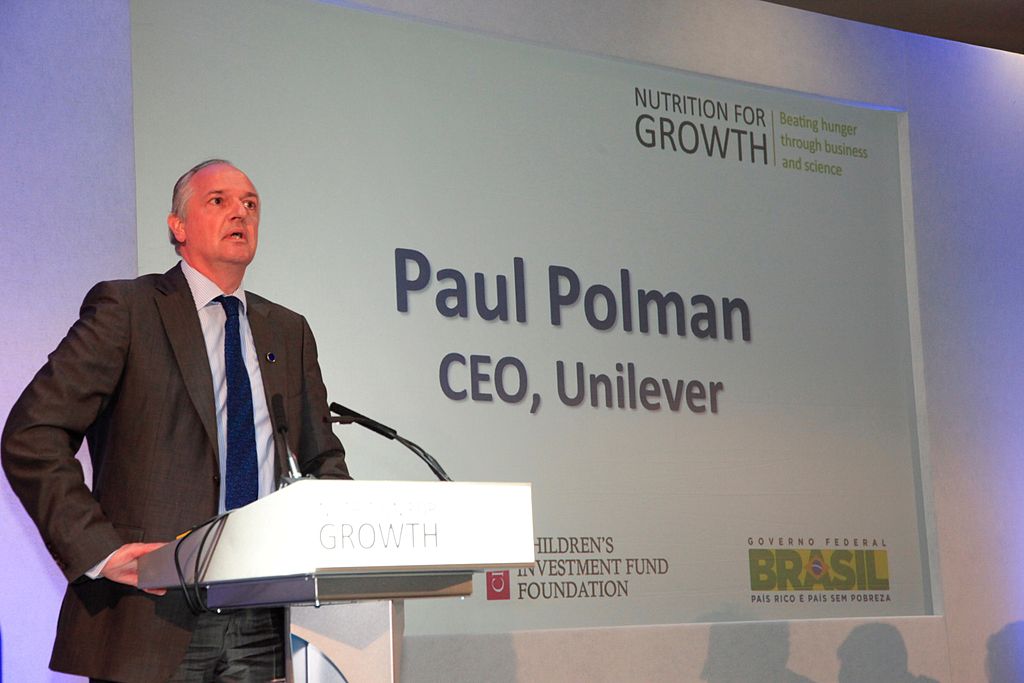[Photograph of Paul Polman - CEO of Unilever by DFID under Creative Commons]
“If the rate of change on the outside exceeds the rate of change on the inside, the end is near” – Jack Welch
Despite this warning many companies continue to turn a blind eye towards changes sweeping the world of business.
Let us take a basic premise on which business is based. Traditional companies believe that the business of business is to maximize profit for its shareholders to the exclusion of everything else. This school of thinking gained legitimacy following celebrated economist Milton Friedman’s often-quoted article in the 1970s in The New York Times, in which he argued that the sole responsibility of a manager is to maximize profit. Generations of managers embraced this commandment although there is no legal compulsion to follow it.
A corporate is a legal entity—an individual in the eyes of the law—and its responsibility is to all its stakeholders, including customers, employees, vendors, government, the community and the environment, and not merely shareholders and investors. Unfortunately, companies have a single-minded focus on their shareholders at the cost of everybody else’s interest.
Traditional companies added up elements that contributed to cost—raw material, labour, other overheads, financing, etc.—and added their profit margin to arrive at a selling price to achieve the company’s profit objectives. In doing so, they were only considering the economic cost of doing business and ignored the social and environmental cost of doing business.
Watch a video of this episode or continue reading
Episode 21: New rules of Business
But the rise of the millennials (those born between 1982 and 2000) is playing a spoiler to this party. As per the 2014 Deloitte Millennial Survey, 75% of the global workforce by 2025 will be made up of millennials, who want to work for companies that make a positive contribution to society and are not single-mindedly pursuing just economic profit. They will also support brands marketed by such companies. Hence, companies have reluctantly started paying obeisance to this new thinking.
This involves embracing principles of conscious capitalism which enunciate that:
- A business should have a higher purpose than just making money; but making money is good for the company.
- It should bring out the best in its employees.
- The company should work not just for its shareholders, but for all stakeholders with equal passion.
- It should build a culture of love and trust.
Living the tenets of conscious capitalism has led companies to pursue not just economic profit, but also embrace strategies that help them pursue what is called Triple Colour Bottom Line (TBL). TBL involves leveraging all three types of capital:
| Colour of the Bottom Line | Type of the Bottom Line | Type of Capital |
| Black | Financial | Economic Captal |
| White | Social | Social Capital |
| Green | Environmental | Environmental Capital |
Pursuing this strategy results in:In the process, companies start focusing on maximizing the interests of all stakeholders—which includes promoters, investors, vendors, customers, employees, the community, government and the environment—instead of just maximizing profit for shareholders.
- Benefiting the society and community in which they do business.
- Ensuring least harm is caused to the enviroment in the process of doing business.
- Taking active steps to invest in repairing whatever damage is caused.
The idea sounds awesome on paper, but are there any dyed-in-the-wool capitalist companies that have embraced the concept?
Yes, corporate biggie Unilever has. The company says it is working towards maximizing benefits for all its stakeholders—investors, consumers, employees and the communities where it operates—rather than pursuing the narrow path of maximizing returns only for its investors.
An article in Fortune magazine (May 2013) quoted its CEO Paul Polman as telling investors: “If you buy into this long-term value model, which is equitable, which is shared, which is sustainable, then come and invest with us. If you don’t buy into this, I respect you as a human being, but don’t put your money in our company.”
Unilever adopted a Sustainable Living Plan in 2010 as a way of doing business. The goal is to double sales by 2020 even as it halves its environmental footprint, and helps more than a billion people improve health and well-being.
Its Lifebuoy brand is at the heart of this plan.
By 2015, the brand “aims to change the hygiene behaviour of one billion consumers across Asia, Africa and Latin America by promoting hand washing with soap at key occasions, thereby helping reduce respiratory infections and diarrheal disease, the world’s two biggest causes of child mortality”.
In the entire process, neither Unilever nor Lifebuoy attempts to market itself. The focus is on improving children’s health by educating them about the benefits of maintaining good health. Along the way, they win the trust of the family.
The benefits for Unilever are clear: parents will be positively predisposed towards the company and brand that is inculcating a good habit in their children and ensuring that they remain healthy. They would support it by becoming its Brand Friends.
Lifebuoy has seen increased buoyancy in its business since it stopped “marketing and selling” Lifebuoy and turned it into an engine for inculcating the simple and good habit of washing hands with soap to remain healthy.
By embarking on this path, Unilever has maximized its environmental, social and financial capital. In the process, it has also managed to refute the long-held view of traditional companies that treating effluents, investing in making their workplaces safer, conserving natural resources, will eat into their bottom line. Such companies never realized that adopting what they believe to be profit-reducing measures can turn out to be the untapped opportunity that makes them more profitable and more competitive.
But is Unilever’s hope based on consumer insight? In Nielsen’s online survey of 30,000 consumers in 60 countries, 55% respondents said they would pay more for products and services from companies committed to positive social and environmental impact. The age group of most people who said they would pay a premium: millennials. No wonder more companies are embracing this new way of doing business.
From Unilever let us move to the world’s most valuable company, Apple. It recently hired Lisa Jackson, former head of the US Environmental Protection Agency, as vice president of environmental initiatives. Her mandate is to transform Apple into an environmental leader. “She is currently overseeing the effort to run 100% of its facilities on renewable power. She is also working on addressing the problem of electronic waste. As of April (2014), every Apple Retail Store will take back any Apple product for free and recycle them,” Fortune wrote in its May 29, 2014 edition, crowning her among the World’s Top 25 Eco-Innovators.
Putting its money where its mouth is, Apple has progressively reduced the weight and size of its products. So, Apple products consume lesser raw materials and more of them can be packed into every shipment. Through research and development, it has also eliminated harmful chemicals like mercury, arsenic, etc. from its products and found more cost-effective alternatives that also make them more efficient. For example, the iMac now consumes only 0.9 watt of electricity in sleep mode. This is 97% less than the first iMacs. Needless to say, both lead to savings for Apple and boost its green bottom line. Both initiatives are good example of tapping into environmental capital.
Also, Apple takes its social responsibility seriously. It is a partner company of the project, Product Red, co-founded by U2 legend Bono in 2006. The project seeks to engage the private sector in raising awareness and funds to help eliminate HIV/AIDS in Africa. As part of the business model, each partner company creates a product with the Product Red logo. This association creates a preference for the brand because it starts being perceived as a compassionate brand. In return for the privilege, a percentage of the profit gained by each partner is donated to a global fund. It also insists that its vendors provide safe working condition to their workers and treat them with dignity and respect.
By voluntarily pursuing TBL, Apple is leveraging all three types of capital and has been crowned the world’s most valuable company.
Since millennials prefer to support companies pursuing TBL, a few unscrupulous companies try to position themselves as pursuing TBL, without contributing to social or environmental welfare. To ensure that this strategy is not misused, independent third party certification bodies have emerged. They certify after due diligence whether a company is indeed following TBL.
Since 2007, Berwyn, Pennsylvania-based non-profit B Lab has sought to offer a certification for companies that meet specific standards for social and environmental welfare, businesses it calls Benefit Corporation or ‘B Corps’. They voluntarily embrace standards of transparency, accountability and performance—qualities that help them and their brands stand out in a highly competitive marketplace. These companies are redefining the concept of business success by not merely wanting to be the best in the world, but also doing what is best for the world.
Embracing the principles of conscious capitalism will help you kill two birds with one stone: your profits are looked after and so is your goodwill among the community in which the company does business.
Pursuing the path of conscious capitalsium will no longer be just a nice path to pursue. It will be the only way to prosper.
[If you have any questions mail us at askrajesh@foundingfuel.com]


